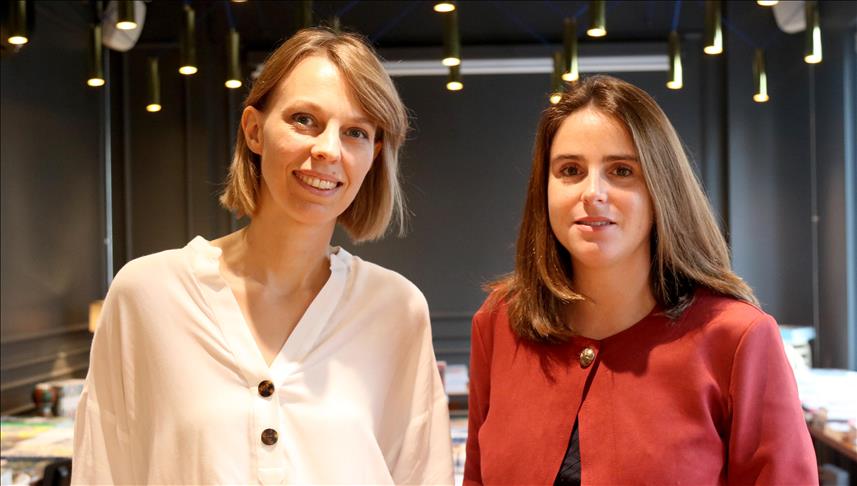Report stresses Turkish solidarity with Syrian refugees
Authors of new Atlantic Council report speak with Anadolu Agency about Turkey's policy towards some 3.5M Syrian refugees
 Laura Batalla (R) and Juliette Tolay (L), the authors of the "Toward Long-Term Solidarity with Syrian Refugees? Turkey’s Policy Response and Challenges" report, pose for a photo during an interview at the Bosphorus Swissotel in Istanbul, Turkey on October 16, 2018.( Merve Sarıkaya - Anadolu Agency )
Laura Batalla (R) and Juliette Tolay (L), the authors of the "Toward Long-Term Solidarity with Syrian Refugees? Turkey’s Policy Response and Challenges" report, pose for a photo during an interview at the Bosphorus Swissotel in Istanbul, Turkey on October 16, 2018.( Merve Sarıkaya - Anadolu Agency )
By Selin Calik Muhasilovic
ISTANBUL
Turkey’s role as the country hosting the largest number of Syrian refugees in the world -- some 3.5 million -- is underappreciated, as are the challenges this entails, and the contributions Syrians make to Turkish society, according to a new report.
Istanbul on Monday saw a special presentation of the report, "Toward Long-Term Solidarity with Syrian Refugees? Turkey’s Policy Response and Challenges," at the Bosphorus Swissotel.
Anadolu Agency had a chance to speak with Laura Batalla and Juliette Tolay, the authors of the report, issued by the Atlantic Council, a Washington, D.C.-based think-tank.
"For several years, Turkey has been hosting the world’s largest refugee population," said Batalla, secretary general of the European Parliament's Turkey Forum, a platform for high-level political discussion between European and Turkish figures.
“We were commissioned this report by the Atlantic Council in order to take a comprehensive look at the policies, actors, and issues that have characterized Turkey’s approach to Syrian refugees since 2011.
"Turkey distinguishes itself from other countries for demonstrating both financial and organizational capacities, as well as a strong political will to welcome refugees. But, still, in many places around the world, people are not aware of the efforts that Turkey has been developing."
Role of NGOs, municipalities
Batalla stressed the importance of diverse actors for handling the refugee issue.
"In this report, the role of actors at the local, national, international and nongovernmental organization (NGO) [levels] such as AFAD [Disaster and Emergency Management Agency], Turkish Red Crescent, Gaziantep Municipality, DGMM [Directorate General for Migration Management], and the United Nations Development Program [UNDP] is provided in order to exemplify the range of efforts in addressing the refugee challenge,” she said.
“We started to analyze from the top political leadership to the national, international levels and local actors to underline the importance of the multifaceted approach to developing a more deliberate and operational strategy."
Batalla underlined that strengthening the mandate and means of municipal governments is crucial, as 94 percent of refugees in Turkey live outside camps in cities, in the midst of Turkish society.
"As the actor working closely with refugees in their daily struggle, municipalities have a great potential, but must be given the tools -- legal and financial -- to develop local solutions to local problems and act accordingly and consistently with the works of other municipalities,” she explained.
"A good starting point would be to take into account the number of Syrian refugees in the total population numbers as regards to future budget allocations from the government. Integration is always contextual, and can best be facilitated in a decentralized manner at the local level."
‘Turkey shoulders burden despite challenges’
Juliette Tolay, assistant professor of political science at the School of Public Affairs at Penn State Harrisburg in the U.S., underlined that in order to understand the evolution of the arrival of Syrian refugees to Turkey, and the responses proposed by the Turkish authorities, the report details three main phases.
"These three main phases are 2011: Improvisation on a welcoming, humanitarian approach, 2012-14: Crafting a policy based on open door, camps, and temporary protection, and 2015-present: Responding to the challenges of long-term settlement and foreign policy developments," she said.
"While the early months saw a great deal of improvisation, this laid the groundwork for the main pillars of the Turkish response: an open-door policy and temporary protection status."
"Turkey shares the refugee burden. There are still many challenges and problems in terms of hosting refugees. But, Turkey has the capacity to overcome the refugee issue with the support initiatives that will encourage Turkey to reach goals."
PR at home
Tolay also stressed the need to engage in public diplomacy in Turkey, a public relations effort about refugees in Turkish society.
"There is a need to better explain what policies are in place toward Syrian refugees and why, to raise awareness both about the positive contribution of refugees to Turkey’s society and economy, and about the collective challenge it represents, so as to make solidarity with refugees a societal project as much as a governmental one,” she said.
“Because they are now part of Turkish society and will stay like that."


